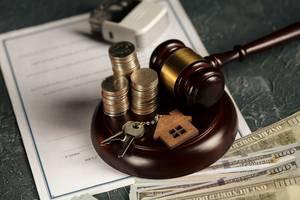How Are Liens Handled During a Chapter 7 Bankruptcy?
 Debt-related issues can be complicated, and understanding the financial issues surrounding the money owed to creditors can often be difficult. In addition to the money a person owes, multiple different types of liens may exist on the property they own. For those who are unable to pay their debts, bankruptcy may be a good option, but they will need to understand how this will affect both the amounts they owe to creditors and any liens that are in place.
Debt-related issues can be complicated, and understanding the financial issues surrounding the money owed to creditors can often be difficult. In addition to the money a person owes, multiple different types of liens may exist on the property they own. For those who are unable to pay their debts, bankruptcy may be a good option, but they will need to understand how this will affect both the amounts they owe to creditors and any liens that are in place.
Chapter 7 Bankruptcy and Different Types of Liens
When a person takes out debts, they will have an obligation to repay what is owed. In some cases, this obligation may be enforced through a lien. A lien will give a creditor a legal claim against property owned by the debtor. In some cases, creditors may be able to enforce liens by repossessing property, or a lien may give them the right to receive payment when the property is sold.
While Chapter 7 bankruptcy will remove a person’s obligation to repay debts, most types of liens will remain in place, and creditors will be able to enforce their legal rights toward property owned by a debtor. Different types of liens may need to be addressed during the bankruptcy process, including:
-
Voluntary liens - These liens will usually be created for secured debts, and they will give a creditor the right to collateral used to secure a debt. For example, when a person purchases a home and takes out a mortgage, a lien will be created giving the lender the right to foreclose on the home if the debtor defaults on the loan. Similarly, an auto loan will create a lien on a person’s vehicle, giving the lender the right to repossess the vehicle if loan payments are not made.
-
Statutory liens - Some liens may be created without the debtor’s consent based on laws that affect them. If a person has unpaid taxes, the IRS or a state or local government may place a tax lien on their home. Mechanic’s liens may also be created if a homeowner or property owner failed to pay a contractor for work performed on the property or if a subcontractor or supplier was not fully paid.
-
Judgment liens - If a creditor pursues a legal judgment against a debtor who has failed to pay debts, a lien may be placed against the debtor’s property. These liens usually apply to property other than real estate.
-
Security liens - In some cases, a person may use property they already own as collateral in a secured loan. This will create a lien against that property, giving a creditor a claim against the property if debts are not paid.
When a person files for Chapter 7 bankruptcy, they will usually be able to discharge all of their debts, and they will no longer be required to make payments to creditors. However, Chapter 7 will not remove most liens, so any lienholders may be able to take action to repossess property, or they may have the right to receive payment if property is sold in the future. In some cases, judgment liens or security liens may be “avoided,” meaning that they will be removed. This may be an option in cases where a lien will affect the value of assets that are exempt from liquidation in a Chapter 7 case, such as furniture or the tools of a person’s trade.
Contact Our New Braunfels Bankruptcy and Liens Lawyer
If you have questions about how to address liens when you file for bankruptcy, the Law Offices of Chance M. McGhee can help you determine the best steps to take to protect your financial interests. We will work to ensure that you will be able to complete the bankruptcy process and return to financial stability. Contact our Kerrville Chapter 7 bankruptcy attorney at 210-342-3400 to arrange your free consultation.
Sources:
https://www.investopedia.com/terms/l/lien.asp
https://statutes.capitol.texas.gov/Docs/PR/htm/PR.42.htm
https://www.law.cornell.edu/rules/frbp/rule_4003






